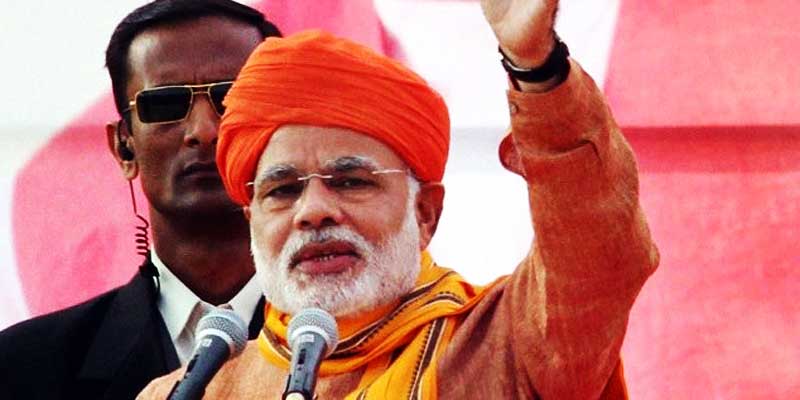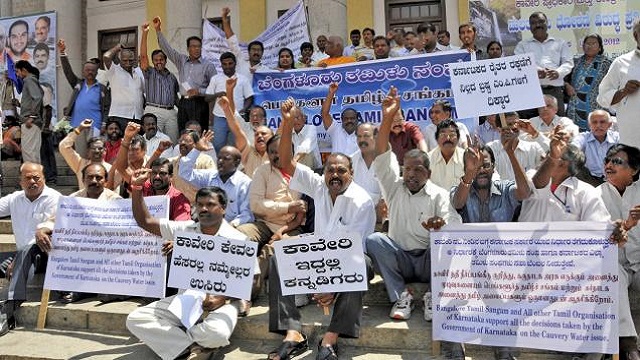Modi is right demanding a ‘debate’ on Article 370 which is not only anti-women but also deepens the rift between “Jaamu and Kahmir and rest of India”.
In May 2004, Manushi editor Madhu Kishwar and author and legal activist Vasudha Dagamwar, in separate articles wrote about the problems with Article 370 of the constitution which grants special autonomous state to Jammu and Kashmir. They stated that the Article 370 was “anti-women”.
Dhagamwar even stated that “women who marry outside the state cannot hold government jobs, and they cannot vote. Their children cannot get admissions in government schools, colleges or professional courses. A person applying for a government job has to produce a certificate of being a permanent resident. A woman’s certificate is marked ‘‘until she is married’’…But a Kashmiri man living in Europe, married not just to a non-Kashmiri but to a non-Indian, he and his wife can buy property in the state. Absurd!”
Her statement holds true even nine years after her article was published in Indian Express.
The same was invoked by Bhartiya Janata Party’s prime ministerial candidate Narendra Modi in his first public rally in the state. Modi, in his address said that even the “sister of chief minister of the state” does not hold any rights in the state. He also said that “there should be a debate over Article 370”.
Modi’s statement created a huge uproar in the state whose politics is based more or less on the Article which has been a defining part of the Indian Constitution.
The chief minister of the state, Omar Abdullah, tweeted in response: “The BJP PM candidate is either very badly informed or very economical with the truth. I’m not sure which one is worse though I challenge him or any of his minions to reproduce verbatim the section of Art 370 that determines the J&K state subject law. He very conveniently used me & my sister as examples to illustrate a point that has NO bearing in truth. Either he lies or is ill informed.”
Modi’s adversaries twisted his words and saying that he wanted to scrap Article 370 which has been BJP’s old stance on the article. They said that Modi was touching a sensitive issue which marked his ignorance regarding the facts. But Modi’s words were undoubtedly a mellowed version of BJP’s old stance.
Former chief minister of Jammu and Kashmir Mufti Muhammad Saeed even went one step ahead and said that one had expected the prime ministerial hopeful to steer clear of divisive issues and follow Atal Bihari Vajpayee in building bridges rather than spark off controversies that have no relevance except trying to reap votes at the cost of national interest.
“Even the ordinary students of constitutional history know that Article 370 providing special status to J&K has gained a permanent status after the Constitutional Assembly of the state approved it,” Mufti issued a statement.
“Even the Article 1 of the Constitution of India, determining the territory of the country applies to J&K by virtue of Article 370 only,” he added.
We should perhaps thank Mr Saeed for reminding that. Because of Article 370 and the mistake that former prime minister Jawaharlal Nehru committed at the UN, it has always been “the state of Jammu and Kashmir and rest of the India” in the mindset of the people. There has never been an attempt to connect the state with the rest of the country.
The politicians in this country has never had the courage to stand among the people of the state and say similar things which they may have told to the people of “rest of India”. The reason is simple – the people of Jammu and Kashmir do not enjoy similar rights and are not benefitted by the central schemes and polices as their counterparts in this “rest of India”.
Modi in his address to the people of Jammu and Kashmir reiterated this fact when he said, “Corruption is rampant in Jammu and Kashmir. Should laws to prevent corruption be there in the state or not? The centre makes rules but these are not applicable in the state because of Article 370.”
Not only that, scholars agree that this difference created is one of the reasons behind the unrest in the state.
This fact also featured in Modi’s address in the state who said that the separatists’ sentiment was only benefitting few political families and not the common man residing in Kashmir valley.
Also, no industrialist can buy land and open a factory or start a business. The people of Jammu and Kashmir remain on the perils of state politicians and what transpires between the central government and the state governmnet because the points of the Article 370 were never debated.
So, was Modi wrong in asking people whether they benefitted because of Article 370 or not? Absolutely not!
However, the debate on Article 370 will only usher further constitutional course. Since Article 1, which defines the Indian territory, applies to the state by the virtue of Article 370, it may also have to undergo amendment. But won’t it be good to change “Jammu and Kashmir and rest of India” to “India”?
Whatever anyone says, in the totality of his speech, Modi was only right about what he said.
FULL TEXT:
Article 370 of the Constitution of India
1. Notwithstanding anything in this Constitution:
a. the provisions of article 238(now repealed) shall not apply in relation to the State of Jammu and Kashmir,
b. the power of Parliament to make laws for the said State shall be limited to;
i. those matters in the Union List and the Concurrent List which, in consultation with the Government of the State, are declared by the President to correspond to matters specified in the Instrument of Accession governing the accession of the State to the Dominion of India as the matters with respect to which the Dominion Legislature may make laws for that State; and
ii. such other matters in the said Lists, as, with the concurrence of the Government of the State, the President may by order specify.
Explanation—For the purpose of this article, the Government of the State means the person for the time being recognized by the President as the Maharajah of Jammu and Kashmir acting on the advice of the Council of Ministers for the time being in office under the Maharaja’s Proclamation dated the fifth day of March, 1948;
c. the provisions of article 1 and of this article shall apply in relation to this State;
d. such of the other provisions of this Constitution shall apply in relation to that State subject to such exceptions and modifications as the President may by order specify
i. Provided that no such order which relates to the matters specified in the Instrument of Accession of the State referred to in paragraph (i) of sub-clause (b) shall be issued except in consultation with the Government of the State:
ii. Provided further that no such order which relates to matters other than those referred to in the last preceding proviso shall be issued except with the concurrence of the Government.
2. If the concurrence of the Government of the State referred to in paragraph
(ii) of sub-clause (b) of clause
(1) or in second proviso to sub-clause
(d) of that clause be given before the Constituent Assembly for the purpose of framing the Constitution of the State is convened, it shall be placed before such Assembly for such decision as it may take thereon.
3. Notwithstanding anything in the foregoing provisions of the article, the President may, by public notification, declare that this article shall cease to be operative or shall be operative only with such exceptions and modifications and from such date as he may notify:
Provided that the recommendation of the Constituent Assembly of the State referred to in clause (2) shall be necessary before the President issues such a notification.
4. In exercise of the powers conferred by this article the President, on the recommendation of the Constituent Assembly of the State of Jammu and Kashmir, declared that, as from the 17th day of November, 1952, the said art. 370 shall be operative with the modification that for the explanation incl. In exercise of the powers conferred by this article the President, on the recommendation of the Constituent Assembly of the State of Jammu and Kashmir, declared that, as from the 17th day of November, 1952, the said art. 370 shall be operative with the modification that for the explanation in cl.(1) thereof the following Explanation is substituted namely:
Explanation—For the purpose of this Article, the Government of the State means the person for the time being recognised by the President on the recommendation of the Legislative Assembly of the State as the *Sadar-I-Riyasat of Jammu and Kashmir, acting on the advice of Council of Ministers of the State for the time being in office.





